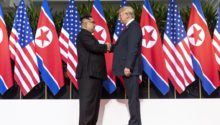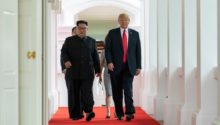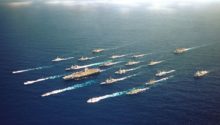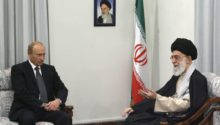contributors
Mahdi Darius Nazemroaya

Social scientist, award-winning writer, columnist, and researcher
all articles


The biggest geopolitical winner of all these events—including Trump’s breach of the JCPOA, which guarantees Iran will look east to Beijing even further—is the People’s Republic of China.


In his two-article series, Mahdi Darius Nazemroaya explores the premises of the thaw between US and North Korea and its possible consequences.


The false concerns of the US government about the peaceful nature of the Iranian nuclear energy program have always been a pretext to justify the US antagonism and drive to get Tehran to act in the interests of the US.


The a negotiated settlement between the People’s Republic of China and the Republic of the Philippines over the Sino-Filipino territorial dispute(s) over ownership of the Spratly Islands (known as Nansha Islands in China) appears possible with the change of government in Manila. The term of the cabinet of Filipino President Benigno Aquino III and Filipino Secretary of Foreign Affairs Albert del Rosario, who both rejected bilateral talks with Beijing, ended on June 30, 2016. They have been respectively replaced by Rodrigo Duterte in the Malacañan Palace and Perfecto Yasay Jr. in the Department of Foreign Affairs. The new Filipino government in Manila has made several overtures about holding bilateral talks with Beijing and Foreign Secretary Yasay has announced that a special envoy will be appointed for negotiations with China…


Since the start of 2016 the mainstream media in the US and the countries that are in Washington’s sphere of influence have been talking about fallout between Russia and Iran over the conflict in Syria. These media reports continuously talk about Russia becoming afraid of Iran or vice-versa, Iran becoming afraid of Russia. These reports constantly talk about competition and rifts between the Iranian and Russian governments over Syria…


After shooting down a Russian Sukhoi Su-24M tactical bomber jet operating in Syrian airspace, in early December 2015 the Turkish government sent a heavily armed battalion to the Zilkan military base in Iraq. This move ignited tensions between Ankara and the Iraqi federal government, which renounced it as an act of Turkish aggression. Within the contours of a resource and energy war, the Turkish military deployment was a move by the Turkish government to secure its illegal oil trade with the so-called Islamic State (ISIL/ISIS/IS/DAESH)…


The Turkish government is not acting alone in Syria and Iraq. The corrupt leadership of the Kurdistan Regional Government, Britain, Israel, and the United States are also involved. They have all played direct or indirect roles in the theft of oil too. After the role of Turkey in stealing oil from Syria and Iraq was revealed, the US government began work to mask and conceal the oil smuggling operations…


Turkish officials were involved in illegal transport of oil from Iraq long before the emergence of the so-called Islamic State (ISIL/ISIS/IS/DAESH). Their illegal trade expanded to the Syrian Arab Republic with the intensification of the conflict in Syria. Turkey, however, is not the only player involved in the illegal oil trade in Syria and Iraq. The operations of the Anglo-Turkish company Genel Energy PLC, which works in Iraqi Kurdistan and Malta, illustrates the constellation of financial and energy sector interests involved…


A few weeks after shooting down a Sukhoi Su-24M tactical bomber jet operating in Syrian airspace, Turkey sent a heavily armed battalion into the Zilkan military base in Iraq. The move can be seen as a compensation for the weakening of the so-called Islamic State of Iraq and the Levant (ISIL/ISIS/IS/DAESH) and the ISIL’s oil smuggling infrastructure. It can also be viewed as a Turkish preparation for the aftermath of the future defeat of the ISIL in Iraq…


Because of the Turkish government’s role in the multi-spectrum US-led war against the Syrian Arab Republic, a war of words has ignited between Ankara and Moscow. Russia, however, is not alone in accusing Turkey of being involved in the theft of Syrian and Iraqi oil. Turkish opposition politicians, Turkish media, and various governments in the Middle East have also raised their voices about the role of Turkish officials in smuggling from the conflict zones in Syria and Iraq…



